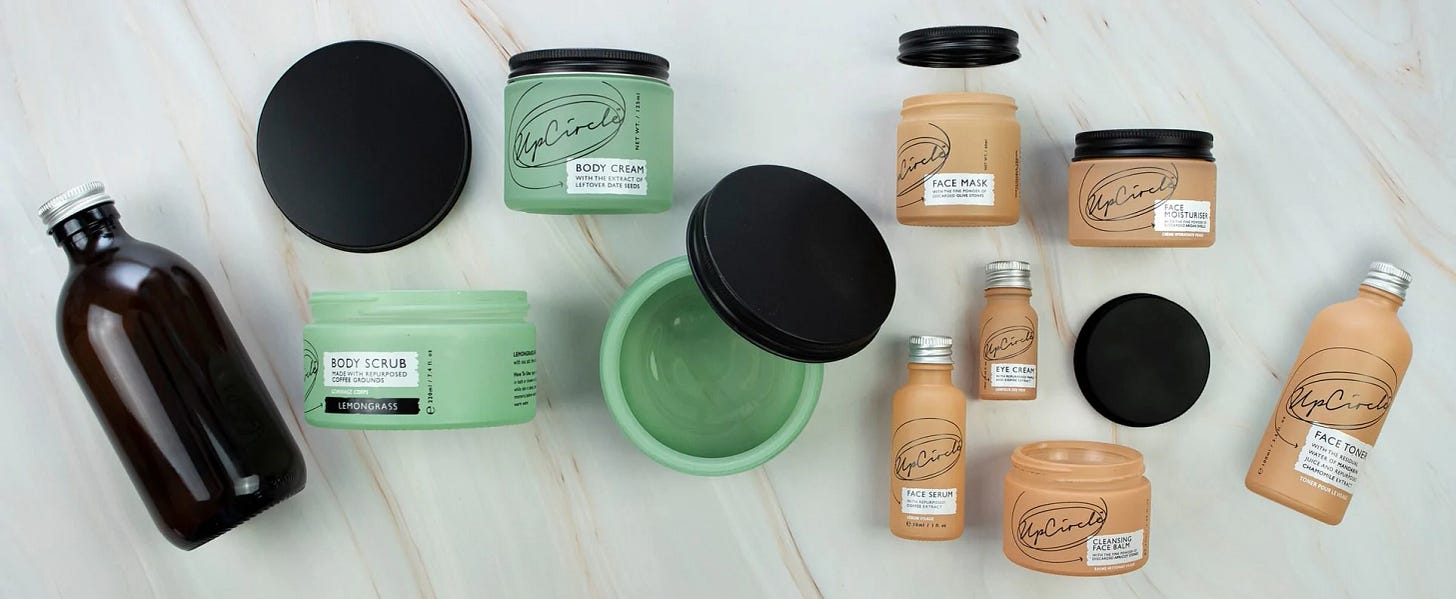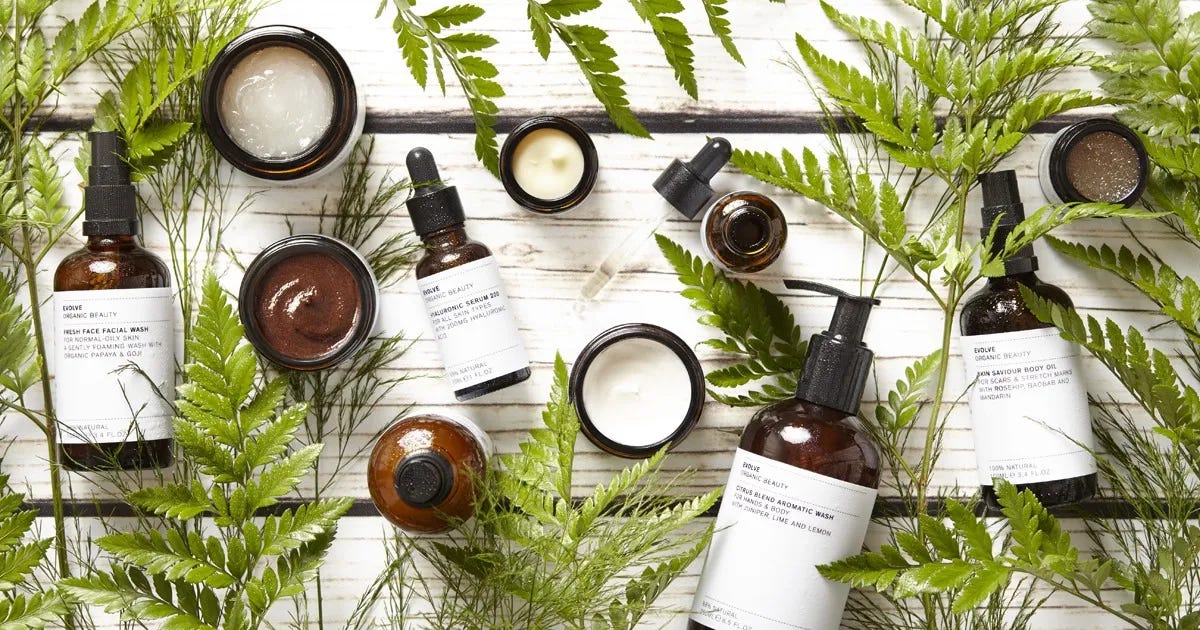🌱 3 Lessons from UpCircle, and inside their partnership with rePurpose Global.
Featuring Belazu, Karma Drinks, Evolve Beauty, eBay and more...
Happy Monday!
This week we cover:
Quick Take: rePurpose Global: How your brand can work with the world’s leading plastic action platform.
Brand Spotlight: Circular and by-product beauty: 3 key lessons from UpCircle.
In case you missed it: 💥 #2 - Meet the Brands: Evolve Beauty’s already Plastic Negative, now it’s working to be regenerative - featuring Laura Rudoe, Founder and CEO.
> Good News Last Week
🎯 Belazu announced their partnership with ReFactory to launch a new waste recycling stream for PPE. ReFactory will turn this into new products like benches and bins. Now, by recycling an estimated 270,000 PPE items each year, Belazu are on track to achieving their annual target of reducing general waste to 9% of our total waste by March 2023.
🎯 Karma Drinks announced they’ve certified as B Corp.
🎯 Tony’s Chocolonely announced it was giving it’s farmers a pay raise to tackle inflation. In Côte d’Ivoire this will see a 82% increase in pay per tonne – to reflect the increased cost of living and increase fertiliser prices.
⭐️ eBay UK announced a £100,000 fund, available to small businesses providing support to the greener fashion agenda. Working with the British Fashion Council, they’re looking to reward companies developing circular fashion technology.
⭐️ Lidl GB has launched a trial of on-shelf refills for laundry detergent. Currently available at two stores, customers are able to pick up a flexible plastic pouch and fill it up on-shelf. Each pouch is made using 33% less plastic than standard bottles of the same side.
⭐️ PepsiCo-owned Walkers announced cardboard boxes will replace all outer packaging for their 22-bag and 24-bag multipacks. They’ve invested £14m to do this, and it will save 250 tonnes of virgin plastic each year.
⭐️Southern Co-op has rolled out soft plastic recycling to 167 stores. They’re working with Jayplas to achieve this.
⭐️ Central England Co-op announced it has saved over 100,000 meals through working with Too Good To Go - equivalent to 250,000 kg of CO2 emissions.
⭐️Tesco announced it is donating £1m to food banks and food charities, after a cohort of food banks launched an emergency appeal. The money will go to FareShare and the Trussell Trust.
⚡️Foodsteps and WRAP announced their collaboration on an Emissions Factor Database which aims to help food and drink businesses in the UK complete their scope 3 emissions reporting. This will be a crucial step in helping the UK food and drinks sector achieve the Courtauld Commitment 2030 GHG target
> Click on each link to read more.
> Quick Take
rePurpose Global: How your brand can work with the world’s leading plastic action platform.
Despite mass media attention on the plastic crisis (read: image of turtle trapped in plastic in the news), the vast majority of the world’s plastic - 79% - is accumulating in landfills or the natural environment as litter.
Whilst the impact on nature and the climate is devastating, it's also critical to remember that the burden of the world’s plastic addiction is disproportionately felt by marginalised communities and communities living in close proximity to plastic production and waste sites. Tackling the plastic crisis is not just an environmental crisis, it’s also an issue of social and environmental injustice.
This environmental injustice appears to be one of the drivers of rePurpose Global, a young, multicultural team running the world’s leading plastic action platform.
rePurpose scouts, vets and onboards local circular economy and waste management projects (or ventures) with decades of experience across 5 countries. Once the ventures are onboarded, rePurpose then designs and funds programmes on behalf of their partners (brands) that enable these ventures to scale-up plastic waste avoidance, removal, recovery, and recycling efforts. So far, their programmes employ over 2400 waste workers in impact projects across three continents, many of whom were previously working informally as waste workers.
Let’s take a closer look at some of rePurpose’s key principles:
Additionality
Every piece of plastic collected on behalf of brand partners is a piece that would have otherwise been bound for nature - ensuring maximum, verified impact from contributions.
Chain-of-custody impact validation
Through localised strategic planning, continuous on-ground monitoring, and tech-enabled fraud detection, the reTrace™ platform (created by rePurpose) ensures complete accountability and verifiability of each piece of plastic collected.
Bigger picture leadership
The Plastic Credit Protocol, rePurpose Impact Code, and work on Plastic Reduction Standards with Verra continuously move the industry towards greater inclusivity and impact, and of course less plastic waste in our environment.
Alongside various plastic removal schemes (1-1 impact, plastic neutrality, or plastic negative), rePurpose also offer sustainability advisory services to increase your brand’s impact, servicing anything from auditing and footprinting, to communications strategies, and circular economy activations. They know that being part of the plastic waste solution isn’t as simple as just paying to have plastic removed.
What have other brands said about the benefits of rePurpose’s schemes? According to rePurpose’s research:
92% of brands agree that the Plastic Neutral Certification strengthened their brand identity.
The Plastic Neutral Certification increased customer retention in 76% of brands.
69% of brands' customer acquisition was positively impacted by the Plastic Neutral Certification.
Let’s be clear: tackling packaging downstream should also be preceded by aiming to design out waste in the first place. So, partnering with a company such as rePurpose Global does not mean you can tick ‘reduce plastic waste’ off of your company’s annual goals list, but it’s a step in the right direction.
Now we know how plastic certifications can work to tackle downstream impact, read an example of how plastic negative certification can be coupled with a circular business model for even greater impact. Looking for an example of a brand that’s worked with rePurpose Global? Read on to learn more about UpCircle, and read Evolve Beauty’s work with them here too.

> Brand Spotlight
The power of by-products: 3 key lessons from UpCircle.
The linear take-make-waste model currently characterises the majority of FMCG businesses, especially when it comes to packaging. Unfortunately, and for the most part, this model results in millions of tonnes of plastic ending up in landfills, burnt, or leaked into the environment. And whilst improving recycling is crucial, we cannot recycle our way out of the plastic issues we currently face. So, we need to look at the issue in a different way, and stop this waste being produced in the first place. This means rethinking products, packaging, and business models through upstream innovation in order to achieve the key circular economy strategies of elimination, reuse, and material circulation.
Circular business models are designed with benefits to society, the environment, and the economy in mind (read our previous digest of this here). Sounds great, right? But moving your business to a truly circular model is no mean feat. The cosmetics industry is particularly packaging heavy - 120 billion units of packaging are produced every year by the global cosmetics industry. So how can brands lead by example and avoid replicating this linear model?
Today we’re focusing on UpCircle Beauty, who have designed their business model to avoid the take-make-waste phenomenon. Their cruelty-free, vegan, zero-waste, ethical, circular, natural skincare (the list of adjectives goes on…) certainly seems too good to be true. Winning features in the likes of Vogue, Evening Standard, the Independent, Glamour, and Marie Claire, let’s dive into 3 key ways they do this, and what you can learn for your business.
1. They upcycle and repurpose by-products of the food industry for their skincare ingredients
UpCircle Beauty was founded to see value in things that already exist. Their products remind us to be resourceful in our production process through upcycling waste products. These upcycled ingredients include:
Coffee grounds (450 tonnes have been transformed into sustainable skincare so far)
Residual chai spices from the production of chai syrups
Olive stones
Fruit waters from the juicing industry
All of these then get transformed into products such as body and hand wash, lotion, toner, or exfoliator which customers can enjoy every day.
2. They are 99% plastic-free and offer a refill scheme
The packaging across the range is 99% plastic-free and they offer plastic-free refill options for the 1%. In addition, you can return your empty packaging to them to be returned and refilled, all at a 20% discount! Key lessons from their refill scheme include:
Product is emptied, washed and returned by consumer at a 20% discount
It is then sterilised using dry heat, a chemical-free process that destroys any bacteria present by exposing the glass packaging to very high temperatures for a prolonged period of time
Read more about their refill scheme here.
3. They are certified as ‘Plastic Negative’
Partnering with rePurpose Global (which we’ve profiled in our Quick Take section this week) they fund an impact project in Goa, India, called Project “Saaf Samudra”. This project has so far removed nearly 1 million single-use plastic pouches from Goa’s coastline: 100% of the plastic recovered on is ‘ocean-bound’, referencing plastic waste in a 100km radius from the coastline that would otherwise have not been collected and would most likely end up in oceans. Project Saaf Samudra is a collaboration between rePurpose Global and V-Recycle.
Overall, brands such as UpCircle remind us that it is possible to have a minimal and even positive impact on the environment whilst still providing value for consumers and running a thriving business. Inspired by UpCircle? If you have tried implementing similar processes at your business, let us know!
Support UpCircle via their shop:

> In case you missed it
💥 #2 - Meet the Brands: Evolve Beauty’s already Plastic Negative, now it’s working to be regenerative.
Featuring Laura Rudoe, Founder and CEO.
> Follow up with…
Article: The plastic waste problem explained
Guide: Building your Net Zero roadmap: a guide for industry leaders and decision makers
Podcast: Raising the Circle



